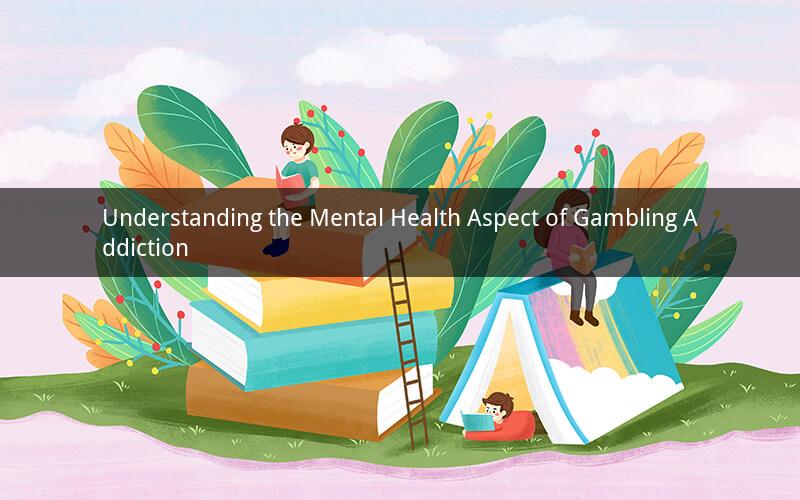
Introduction:
Gambling addiction has long been a subject of debate, with many questioning whether it should be classified as a mental disorder. This article delves into the complexities of this issue, exploring the psychological aspects of gambling addiction and discussing the arguments for and against its classification as a mental disorder.
1. The Psychological Aspect of Gambling Addiction
Gambling addiction is often characterized by an uncontrollable urge to gamble, despite the negative consequences it may have on an individual's life. This addiction can be understood as a mental disorder due to its impact on the individual's psychological well-being. Here are some key points that support this perspective:
a. Cognitive Disturbances: Individuals with gambling addiction may experience cognitive disturbances, such as impaired decision-making, risk assessment, and impulsivity. These cognitive impairments contribute to the continuation of their addictive behavior.
b. Emotional Regulation: Gamblers often turn to gambling as a means of coping with negative emotions, such as anxiety, depression, or boredom. This reliance on gambling as an emotional coping mechanism can be seen as a psychological disorder.
c. Impaired Social Functioning: Gambling addiction can lead to strained relationships, financial problems, and legal issues. The inability to control one's gambling behavior and its subsequent negative consequences highlight the psychological impact of this addiction.
2. Arguments Against Classifying Gambling Addiction as a Mental Disorder
Despite the psychological evidence supporting the classification of gambling addiction as a mental disorder, some argue against this perspective. Here are the main arguments:
a. Lack of Consensus: There is no unanimous agreement among experts regarding the classification of gambling addiction as a mental disorder. Some argue that it should be considered a behavioral addiction, rather than a mental health issue.
b. Cultural and Social Factors: Critics argue that the classification of gambling addiction as a mental disorder may be influenced by cultural and social factors. They believe that gambling addiction is more a result of personal choices and external influences rather than a genuine psychological disorder.
c. Ethical Concerns: Some individuals argue that classifying gambling addiction as a mental disorder may stigmatize individuals and discourage them from seeking help. They believe that focusing on the individual's responsibility and personal choices is a more effective approach.
3. The Importance of Recognizing Gambling Addiction as a Mental Disorder
Despite the ongoing debate, there are several reasons why recognizing gambling addiction as a mental disorder is important:
a. Treatment and Support: By acknowledging gambling addiction as a mental disorder, individuals can access appropriate treatment and support services. This can help them overcome their addiction and improve their overall well-being.
b. Public Awareness: Recognizing gambling addiction as a mental disorder can raise public awareness about the issue, leading to more informed discussions and policies regarding prevention and intervention.
c. Legal and Ethical Implications: Classifying gambling addiction as a mental disorder can have legal and ethical implications, such as protecting individuals' rights to treatment and ensuring that they receive appropriate care.
4. The Role of Treatment and Support in Overcoming Gambling Addiction
Whether or not gambling addiction is classified as a mental disorder, effective treatment and support are crucial in overcoming this addiction. Here are some key elements of treatment and support:
a. Therapy: Cognitive-behavioral therapy (CBT) has been shown to be effective in treating gambling addiction. This therapy helps individuals identify and change negative thought patterns and behaviors associated with their addiction.
b. Support Groups: Joining a support group, such as Gamblers Anonymous, can provide individuals with a sense of community and shared experiences. This can be a valuable resource for support and encouragement during their recovery journey.
c. Medication: In some cases, medication may be prescribed to help manage symptoms of depression or anxiety that may contribute to gambling addiction.
5. Conclusion
The debate over whether gambling addiction is a mental disorder is complex and multifaceted. While there is evidence supporting its classification as a mental health issue, there are also arguments against this perspective. Regardless of the classification, recognizing gambling addiction as a serious problem is crucial for providing effective treatment and support to individuals struggling with this addiction. By understanding the psychological aspects of gambling addiction and the importance of treatment and support, we can work towards a healthier and more informed approach to addressing this issue.
Questions and Answers:
1. Q: Can gambling addiction be treated?
A: Yes, gambling addiction can be treated. Effective treatment methods include therapy, support groups, and medication, depending on the individual's specific needs.
2. Q: What are the risk factors for developing gambling addiction?
A: Risk factors for gambling addiction include a family history of addiction, impulsivity, mood disorders, and exposure to gambling at a young age.
3. Q: Can gambling addiction be prevented?
A: While it is challenging to prevent gambling addiction entirely, certain strategies can help reduce the risk, such as promoting responsible gambling practices and raising awareness about the potential dangers of gambling.
4. Q: How does gambling addiction affect the individual's relationships?
A: Gambling addiction can strain relationships, leading to financial problems, emotional distance, and trust issues. It is crucial for individuals struggling with this addiction to seek support and work on rebuilding their relationships.
5. Q: What is the difference between gambling addiction and problem gambling?
A: Problem gambling refers to a range of gambling-related behaviors that cause distress or harm, while gambling addiction is a more severe form of problem gambling characterized by an uncontrollable urge to gamble and significant negative consequences.